Search Results for: F word
Since I haven’t reviewed all my top 25 scripts and a bunch of you have e-mailed me asking what they’re about, I decided to give a quick blurb about each one. I’ll divide this into two parts. Oh, and because I’m lazy, I’m not including links. You’ll have to reach over to the top 25 list and get the scripts from there (I know – I’m a horrible person).
1) EVERYTHING MUST GO
Genre: Indie Drama
A guy loses his job and his wife. She’s changed the locks to the house and left all of his furniture outside. Instead of shipping it off, he sets everything out in the front yard and starts living there. The reason I love this script so much is because the main character does exactly what I would do in this situation. You want me to leave? I’ll do the opposite. I’ll stay. It’s a bit of a strange plot and weird enough so that a good portion of you won’t like it, but it’s my favorite script of 2008.
3) THE F WORD
Genre: Comedy
A very simple premise. Guy meets girl, girl has boyfriend. Guy and girl become best friends. Guy and girl try desperately not to hook up. No huge surprises or twists here. Just an amazingly executed script. Very funny.
4) JUNIOR EXECUTIVE
Genre: Indie Comedy
In an attempt to get his estranged pilot father to come back into his life, a high school kid decides to build his own airport. If you’re a Wes Anderson fan, you have to read this script. Quirky, weird, hilarious. The writing is so simple as to make it look amateur but once you get going, you can’t stop. This one’s out there, but if you buy into a few early absurdities (borrowing 500k like it’s as easy as buying ice cream for example) it’s a great read. (note: no link for this. if you want it, contact me directly)
5) BRAD CUTTER RUINED MY LIFE AGAIN
Genre: Comedy
A hilarious script about a former high school nerd finally making his way in the world, only to find out that his company is hiring the most popular kid from his old school. Before he knows it, the company turns into its own high school, and once again, he’s the nerd.
6) BRIGANDS OF RATTLEBORGE
Genre: Western
I hate Westerns. But something about this one got me. What’s interesting is that this script breaks about every screenwriting rule there is. And it ended up being the top rated script on the 2007 Blacklist.
9) GOING THE DISTANCE
Genre: Comedy
A simple comedy about the trials and tribulations of long distance relationships. Geoff, the writer, is a master of comedy dialogue. Anyone who’s been in a long distance relationship can relate to this one.
10) WINTER’S DISCONTENT
Genre: Comedy
One of the most unexpected reads of the year. A bunch of old dudes looking for nookie in a nursing home. American Pie for the Viagra generation. Hilarious.
11) THE ORNATE ANATOMY OF LIVING THINGS
Genre: Indie Dramedy
Charlie Kaufman-inspired, the story of a man who finds out there’s a museum dedicated to his life. Very weird but very cool. One of the more imaginative scripts I’ve read. Was on the 2007(?) Blacklist. These are the same guys who brought you The Adventurer’s Handbook.
13) LAST NIGHT
Genre: Drama
This one’s already been shot with Keira Knightly and Eva Mendes. A woman (Knightly) starts to suspect her husband of infidelity with an extremely attractive coworker (Mendes). Things get complicated when he goes on his next business trip.
14) THE HANGOVER
Genre: Comedy
Much funnier than the trailer showed. But it’s a great little premise. Four guys have to piece together their drunken night to find a missing groom (who’s getting married THAT day). This is one of those scripts you read and immediately say, “I could see that as a movie.” Funny funny funny.
I’ll post the second half later in the week folks. Til then…
Genre: 30 min. Comedy/Period
Winning Logline: A troupe of struggling actors fight for relevancy for their small, dingy theatre located directly across the cobblestone street from Shakespeare’s Globe Theatre at the height of its fame.
About: Dan Martin beat out seven other contenders on Pilot Showdown Day with his clever logline. It is the first comedy pilot reviewed on the site in over four months! Can he do the impossible and win over a Scriptshadow comedy crowd that is said to be even more discerning than the crowds at the Globe Theater???
Writer: Dan Martin
Details: 34 pages

If you had told me I’d be traveling back 5+ centuries TWICE in the same week to review scripts, I would’ve told you… well, I would’ve told you that’s possible because that’s the wonderful world of screenplay-reading. You never know what you’re going to get.
It is the year 1594.
Playwright Thaddeus Longfellow is with his friend (who he secretly loves), and actress, Katherine Greyman, at the world-famous Globe Theater, watching Romeo and Juliet. In the audience is the writer, William Shakespeare, who loves himself more than anything else on the planet. This man’s life is the life Thaddeus dreams of living.
But that life probably isn’t going to happen anytime soon because Thaddeus has had writer’s block for over a year. As he frustratingly picks up Katherine (she’s in tears after the ending of Romeo & Juliet), they head back to their theater, The Silver Theater, across the street.
The Silver Theater, and pretty much everybody who works there, suck. You’ve got Michael the Mute. Kurtus the German (who’s actually from Austria). As well as a number of other not-attractive-enough actors casually awaiting their next play – casually because Thaddeus doesn’t have any new material.
But then Thaddeus has an idea. Through the grapevine, word is that Shakespeare doesn’t write his own stuff. It’s actually ghost-written by a guy named Joseph Noone. So Thaddeus recruits Noone to write the Silver’s next play. The cocky Noone comes in and writes one of the worst plays ever, making the Silver’s acting troupe look even worse than they already are. And the out-of-ideas Thaddeus goes wandering the streets drunk, fantasizing about killing himself.
But right before he takes action, he runs into none-other than an also-drunk William Shakespeare. Shakespeare and Thaddeus get to talking and Shakespeare says it’s lonely at the top. I don’t know if people love my writing or just love it because my name’s attached to it. It would be nice to know if I’m actually as great as I think I am. And that’s when Thaddeus gets an idea: Give me one of your unknown scripts, I’ll play it at my theater, and we can find out together. Shakespeare agrees and that’s the end of episode 1.
I feel a little out of my comfort zone here. Analyzing half-hour comedy is not one of my strong suits. I find that because comedy is so subjective it’s very hard to gauge when the comedy is working and when it isn’t.
I was recently on a Zoom consultation for a comedy spec and the writer and I were talking about some of the jokes in his script. I told him I wasn’t laughing at them and I proceeded to offer some alternatives which he, then, proceeded to tell me were even less funny. And that’s how a lot of generating comedy goes. It’s not easy.
Despite that, my big takeaway here was this: We need more jokes.
When I first read that great logline for the pilot, I thought, “That’s good. That could be really funny.” And the main thing I imagined was leaning into the contrast between the two theaters. We would see perfectly choreographed comedy perfection at the Globe and then quickly cut to the lazy sloppy mistake-prone acts at the Silver Theater.
And we do get a little of that here. But not as much as I wanted. Which I think is Dan’s big mistake is he focused more on the plot than anything else. And, with comedy, you have to focus on the jokes. Where do the funny jokes come from? They come from characters. So you want to spend a ton of time coming up with the funniest characters possible.
Instead, we get a ton of plot here. And, to Dan’s credit, it’s good plotting. We set up the contrast between the two theaters. How Silver Theater is barely paying its bills. We set up our hero’s primary flaw, that he’s got debilitating writer’s block and can’t create anymore. We set up the rivalry (or perceived rivalry in Thad’s head) of Thad and Shakespeare. We watch him hatch his plan of recruiting Shakespeare’s ghostwriter. And then we get the big ending reveal, which is that, to save the theater, Shakespeare has agreed to allow them to anonymously use his play.
But because we had to set all that up, we didn’t get enough of the comparisons between the two theaters. I always try and remind writers – especially writers who win these contests with beloved loglines – to lean into that beloved concept as much as possible. Because that’s what we voted for. That’s what excited us. So if you’re spending 80% of the pilot on plot and setup instead, the reader’s going to feel let down.
Now, I’m guessing Dan would argue that the plan is to do exactly that throughout the rest of the show. It’s TV so there will be many episodes to play with this fun concept of the Globe Theater vs. the Silver Theater. Meanwhile, for this episode, he’s got to set everything up! But this is why screenwriting is hard. Readers and viewers don’t care that you have to set things up. If it’s a comedy, they want to laugh NOW. And that’s what I wanted, too.
I’m not going to pretend like I know exactly how to redraft this pilot to achieve this. But my initial thought was we needed to spend more time at The Silver Theater. I want to see just how bad it is there. I want to meet every hilarious character. I want to watch the world’s worst play. And, afterward, I want to see all of them disperse and go to their corners and complain in funny ways about all the reasons why their genius isn’t being allowed to shine.
To me, the most recent example of a great TV comedy ensemble was The Office. And while they didn’t have time in that pilot episode to introduce everyone in the office, they gave us Michael. They gave us Dwight. They gave us the Intern. And we got a few quick scenes with people at the back of the Office. And you were laughing! Cause they were all funny.
When I look at Thad, I’m not sure I find anything funny about him. He’s more of a tragic figure. He’s sad about Shakespeare being better than him. He’s sad about his writer’s block. Where are the laughs? One thing I know is that your lead comedy character needs to be funny. So Thad needs to be reimagined at the very least. You’d be surprised at how that could then open up comedy everywhere else.
Cause think about Michael in The Office. His comedic construction was not only great for him, but it allowed the writers to build Dwight around him, with Dwight being obsessed with Michael and wanting to make him happy no matter what. If you don’t first figure out Michael’s comedic angle, you can’t build Dwight’s comedic angle. So I could see the same happening once you figure out Thad.
Comedy is hard. Pilots are hard. Comedy pilots are, therefore, very hard. That’s what she said. Sorry, I’ve got Michael Scott on the brain. So I’m not trying to kill Dan here. I understand the difficulty of the task he’s up against. But I think Dan was too plot-focused in the writing of this pilot when he needed to be more character and comedy-focused. Give us funny characters, make us laugh as much as possible. Even if this comes in the package of a thin plot, we’ll still watch the next episode.
P.S. It might be funny to add a mockumentary style to this since it doesn’t make sense whatsoever for the time. One of the reasons The Office (and shows like it) were able to establish their comedic characters so quickly is because they could be asked direct questions about themselves in interviews. Which helped the viewer IMMEDIATELY get the characters. For example, in Michaels’s very first interview in The Office, he’s pointing to his “World’s Best Boss” coffee mug. We immediately understand, in that moment, what’s important to him, and where his comedy is going to come from.
Pilot Script Link: Playwrong
[ ] What the hell did I just read?
[x] wasn’t for me
[ ] worth the read
[ ] impressive
[ ] genius
What I learned: In my experience reading comedy, writers need to write at least twice as many jokes as they actually write. Because you have to remember that some jokes aren’t going to hit. This is something that Judd Apatow will tell his feature writers from time to time: “Go through the script and add 50 more jokes.” Cause the worst thing that can happen when reading a comedy script is the reader doesn’t laugh enough. So make sure they have enough to laugh about.
 This contest is bigger than a Star Destroyer!
This contest is bigger than a Star Destroyer!
For those of you just joining in on the fun, every Thursday of 2024, I’ve been guiding Scriptshadow readers through the process of writing a screenplay. We wrote the first draft over the course of four months. This week, we just finished our second draft. And now we’re down to the final month, where we polish the script.
I’m going to put up an official announcement for the Mega-Showdown soon, as well as announce it in the July Newsletter (e-mail me at carsonreeves1@gmail.com if you want to receive my newsletter). But starting today, you CAN submit your Mega-Showdown script.
Here are the details…
What: Mega-Showdown (Online Feature Screenplay Contest)
What I need: Title, genre, logline, your first five pages
Optional: tagline, movie-crossover pitch
Contest Date: Friday, July 26th
Deadline: Thursday, July 25th, 10pm Pacific Time
Send to: entries should be sent to carsonreeves3@gmail.com
How: Include “MEGA” in subject line
Price: Free
It’s going to be an amazing event. On July 26th, I’ll post loglines for the ten best entries, including the first page. Everybody on the site will vote. The four scripts that get the most votes will move on to the next stage. The very next week, each of the four final scripts will get their first five pages posted on their own individual day.
I’ve heard how guys want to actually see what the writing looks like in these scripts. Now you’re going to be able to dig in and really determine which script is the best written. Then, that following weekend, starting Friday, July 2nd, we will have a second voting process where the four top scripts will be voted on to determine the winner. The inaugural Scriptshadow Mega-Showdown winner will then get a script review on Monday, August 5th.
Okay, now that you’re all pumped up, let’s talk about polishing your script.
Just like a lot of terms in screenwriting, “polish” means different things to different writers. For some, it means dotting their I’s and crossing their T’s. For others, it means a full on mini-rewrite.
How extensive your polish should be will be determined by how much time you have. In this case we have exactly four weeks. Here’s what I can tell you you can do and can’t do in four weeks.
You cannot make any major character changes in four weeks. You can’t, for example, change your main character’s flaw. Or turn them from a man into a woman. Or change their job from a CIA agent to a tech CEO. Those types of changes have tentacles in so many parts of the screenplay that you’re essentially doing a page-1 rewrite. And you don’t have time for that.
Nor do you have time to make major structural changes. If you realize that your midpoint should actually be the end of your first act, you’ll be cutting out 25+ pages. How many of those pages can be redistributed? How much new story will you have to write? Probably too much to do so effectively in four weeks.
If you’re doing a “mini-rewrite,” – in other words, a polish where you’re still making some creative changes – then stick to improving scenes as best you can as well as improving important subplots. Neither of these changes is going to affect the overall parts of the script. So you can fix them quickly.
I encourage you to identify your 5-7 most important scenes and ask yourself, “Are these as good as they can be?” If they’re a suspenseful scene, can you do something to make them even more suspenseful? If they’re an action set-piece, are you being as imaginative as you can be? If they’re a dialogue scene, can you be more creative with the dialogue, or funnier, or more clever?
Those scenes are really going to sell your script so they need to be as good as possible.
When it comes to rewriting subplots, I included a qualifier there: “IMPORTANT.” Minor subplots, such as Allan’s (Michael Cera’s) subplot in “Barbie,” don’t move the needle either way. Those subplots aren’t going to affect how your reader feels at the end of your screenplay. So unless they’re disastrous, don’t worry about them.
But if the Chief of Police’s (Keegan-Michael Key) subplot in Wonka is weak, that’s something worth tidying up because he has a fairly substantial arc in the film as he’s struggling to decide whether to heed the chocolatiers’ wishes and take down Willie Wonka or do what he knows is right.
You’ve got about two weeks to take care of these things before we move on to grammar and spelling. So don’t take on any task that you think may be too difficult to manage.
And I know some of you may be freaking out and thinking you don’t have enough time to do everything you have to do. First off, that’s natural to think as a writer, especially if you’re a perfectionist. But also, consider that when you become a professional writer, one of the biggest adjustments you will be asked to make is writing on a schedule. You will have to hit deadlines. This is the perfect time to practice for that.
Challenge yourself! You’ll be surprised what you’re capable of when you push past your comfort zone.
Mega-Showdown. 30 DAYS AND COUNTING!
If Monty Python announced they were writing again, this would probably be their first movie adaptation.
Genre: Period/Comedy
Premise: The long-lost twin sister of a Duchess infiltrates the kingdom’s walls, impersonating her dead sister, who, unbeknownst to the kingdom, fell victim to the fast-rising killer pandemic known as “The Red Death.”
About: Screenwriter (and director) Charlie Polinger has been making waves with his short films and just recently signed Joel Edgerton onto his first feature, “The Plague,” about a 12 year old boy who gets bullied at a water polo camp (the bad kids convince others to stay away from him by saying he has “the plague.”). Today’s much more extensive concept would conceivably be his third movie, after he proves he can handle escalating budgets in his first two.
Writer: Charlie Polinger (story by Edgar Allen Poe)
Details: 122 pages
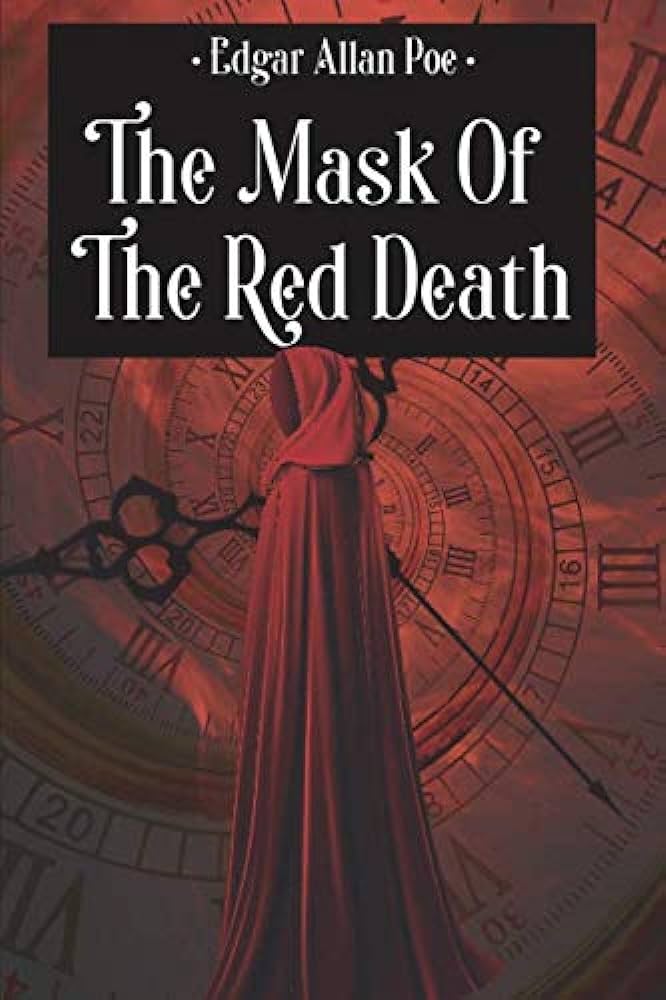
We have another great example here of utilizing IP from the public domain. There are thousands of stories out there that, if found, could easily be turned into movies. You must be alert to that.
I asked ChatGPT for the five best Edgar Allan Poe stories that have not been turned into movies yet and this is what it gave me. Feel free to start writing one today.
“The Devil in the Belfry”: A humorous tale about a small town’s chaotic experience when a devilish stranger disrupts their routine.
“A Tale of the Ragged Mountains”: A mysterious story involving mesmerism, hallucinations, and a strange adventure in the mountains.
“The Spectacles”: A comedic narrative about a young man who mistakenly courts his great-great-grandmother due to poor eyesight.
“Hop-Frog”: A dark revenge tale about a court jester who enacts a gruesome revenge on the king and his ministers.
“The Man of the Crowd”: A psychological tale focusing on a man who obsessively follows a mysterious figure through the streets of London.
The Spectacles is definitely the funniest one. I don’t know if you could build an entire movie around it. Hop-Frog has some potential, especially if you update it to modern day. And it looks like Christopher Nolan already stole one of these for himself, adapting it into his first feature, “Following.”
Let’s see if today’s script is as good as any of these…
It is the 14th century and Prince Prospero’s people are being ravaged by the Red Death, a virus so nasty you could be pulp within hours of getting it. The cowardly Prospero orders the gates of the kingdom to be closed so that all of the upper-crust folks are safe from what is thought to be a ‘peasant disease.’
When Prospero’s sister, Duchess Margarita, conveys her disdain for such action, she’s kicked out of the council and she leaves the kingdom. She just so happens to run into her doppelganger, Isabel, who it turns out is her long-lost twin sister, who was supposed to be killed due to being the offspring of the chambermaid.
After Margarita quickly succumbs to the Black Death, Isabel and her 13 year old daughter, Rose, decide that they stand a much better chance against the Red Death inside the kingdom’s walls compared to out. So they head to the castle where Isabel pretends to be Margarita. Rose pretends to be the young peasant who found and saved her life.
Prince Prospero is thrilled that his sister is back but both Isabel and Rose quickly find out that Margarita is kind of hated around these parts and some people – the Princess’s handmaiden in particular – are desperate to kill her. That would seem like the worst of it but Isabel also must fend off people like 60-something Franz (who presents as 80-something), eagerly anticipating (assuming that she’s Margarita) their next hookup. Isabel is horrified.
Isabel will have to navigate a world – royal family politics – she has no reference for, which has numerous family-members dying around her for the most shocking of reasons (Poor Franz is dressed up like a bear to be killed in a pre-dinner duel so that Prospero may slaughter him and therefore be seen as a “powerful” prince). It isn’t long before Isabel starts to wonder… is it really better inside these walls than out?
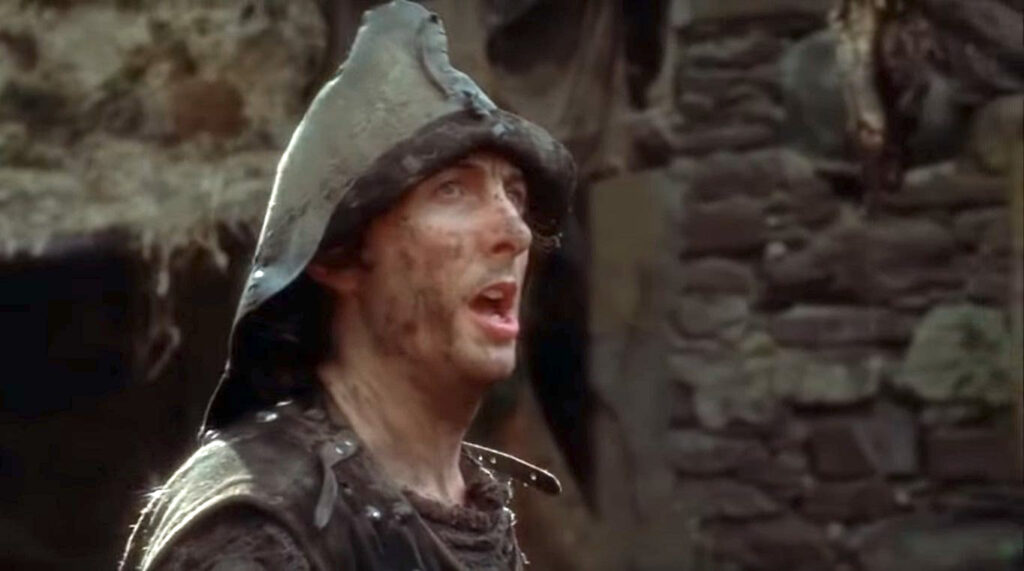 “Bring out yer dead!”
“Bring out yer dead!”
This was surprisingly good.
It’s got a healthy dose of Myton Python guiding it.
I think the biggest surprise is how timeless the humor is. A lot of the funny moments from this story would work in movies today! Which is probably what Polinger saw in the story.
The scene where Isabel is hanging out in her bedroom and this lecherous old man comes in ready to do the dirty and she has no idea what’s going on – that joke works in 1850 and 2050.
As does the head guard, Sven, who spends every day waiting for anyone to show even the barest signs of the Red Death and then beheads them on the spot, lol. Again, that joke works in 1400. It works 2200.
Even Hop-Frog (from the earlier loglines) makes an appearance at dinner, swinging awkwardly from the windows, stumbling around, accidentally tearing curtains off, failing to land flips. His jestering antics are funny anywhere.
The script also has some edge to it. Prospero is such a wimp that he craves humiliation in all its forms, succumbing to regular golden showers from his ditzy wife’s power-hungry handmaiden.
There isn’t a lot of humor celebrated on this site. Most of the comedy scripts are barely able to scrape together a few chuckle-worthy jokes. This one’s got lol jokes from start to finish.
It’s also built on a powerful storytelling device – LYING. Lying is a very powerful engine in and of itself because it requires characters to hide things. And that’s always fun to watch. We just saw this in yesterday’s script. The main character, whatever her name was, was built around her dependence on lying.
In this case, lying takes even more of a front seat because there’s more at stake. Isabel is lying about her identity and if she gets caught, she’s killed. So every situation she’s in feels big.
And for those who bought my dialogue book, you will recognize this as REVERSE DRAMATIC IRONY, or some call it “Superhero Dramatic Irony,” because we know who the main character really is but nobody else does (just like we know Clark Kent is Superman but nobody else does).
This means that every interaction she gets in is going to have subtext attached to it.
But the script does have a major flaw, which is that it doesn’t have a plot. Once Isabel gets into the kingdom, she doesn’t have much to do other than avoid getting exposed. A negative goal doesn’t power a narrative. You can get 5, 6, maybe even 7 scenes out of the initial comedy of Isabel trying to fit in and pretend she’s a Duchess. But, sooner or later, the audience wants to know where we’re headed.
For example, something you might do is reveal that there’s a secret plan, from some power-hungry character, to kill Prospero in five days. And maybe Isabel doesn’t like Prospero so she’s initially fine with this. But, as time goes on, she kinda likes the guy. And now she has to decide whether to tell him and save him.
That’s just one example of what you could do. Notice that it gives the reader a destination. It provides some suspense. We’re going somewhere with the story as opposed to wandering around the halls waiting for things to happen.
They finally figure out who Isabel is and now she has to fend for herself. After that, we get a really wild weird ending which is what ALWAYS happens when you write a narrative that doesn’t have a purpose. Your ending comes around. You’re not sure what to do. So you THROW THE CRAZIEST SH*T YOU CAN THINK OF at the reader to try to shock them into forgetting that there hasn’t been a plot for the last 60 pages.
I don’t know if that’s what happened in the original story or how much of his own ideas Polinger is adding to the script. Not to say the script was bad. It was just that, so much of this script is really fun. So the messy ending stands out as a sore spot.
But the script’s definitely worth a read. This is one of the better scripts on the 2023 Black List for sure.
[ ] What the hell did I just read?
[ ] wasn’t for me
[x] worth the read
[ ] impressive
[ ] genius
What I learned: Be careful about any creative choice that forces your hand for the rest of the script. Early on here, when Isabel first impersonates Margarita, she also pretends to be blind due to falling off her horse and hitting her head. It leads to some funny moments early on. Everyone will have to walk across the room and Isabel will walk in the other direction. The problem is, you now have to commit to that blindness FOR THE ENTIRE REST OF THE MOVIE. Which is a hassle. Cause I guarantee there will be dozens of times when the scene would be a lot easier to write if the character could see. So you lock yourself into this annoying trait for, what amounts to, two minutes of funny jokes. Always weigh every major creative choice against how it affects the rest of the screenplay. Sometimes these things just aren’t worth it.
From Seinfeld to Inside Out to A Quiet Place to House of the Dragon, this may be the most mishmashy of Mish-Mash Mondays ever!
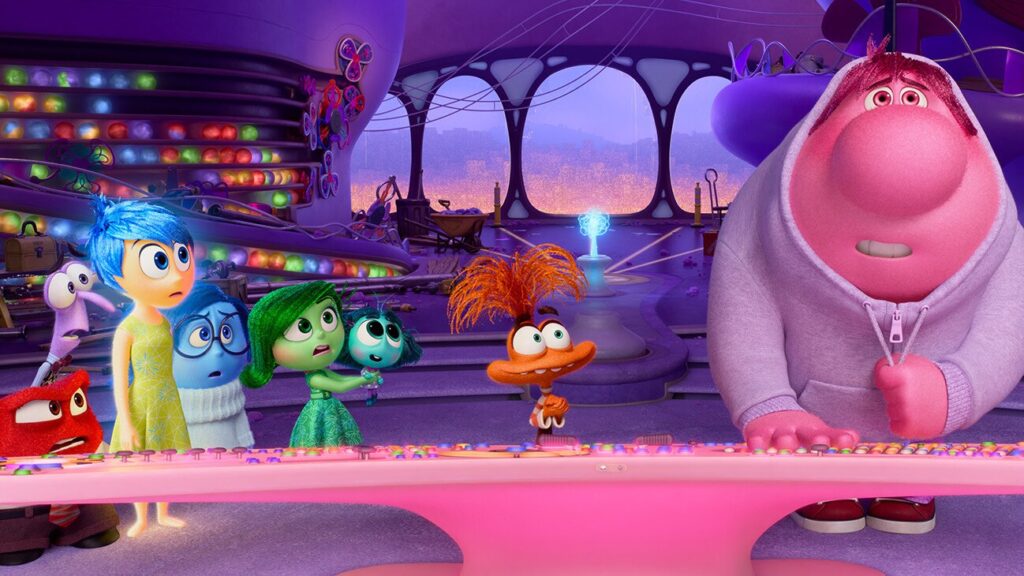
Because I watch Seinfeld so much, Youtube always recommends Seinfeld-related content to me.
Yesterday, it recommended me this couple, who had never seen Seinfeld before, watching a video compilation of “all the best Seinfeld moments.” The first scene in the compilation is a famous scene from an early season where Jerry and Elaine pick up a car from a car rental company.
In it, the car rental attendant tells Jerry that the car he reserved isn’t available. The next series of jokes is Jerry pointing out that the whole point of a reservation is that the car remains reserved. “Anybody can just TAKE reservations,” Jerry says.
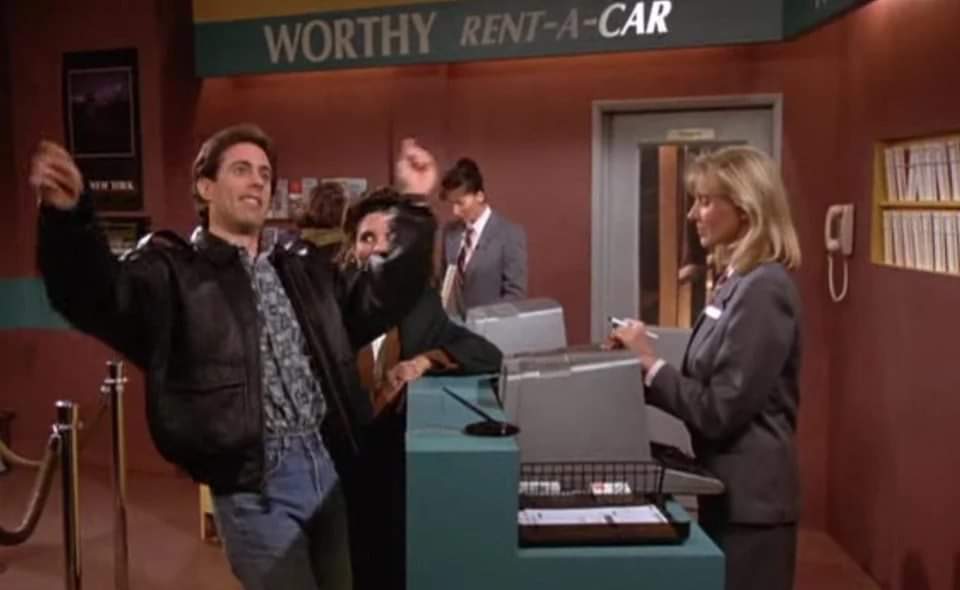
The couple watching this clip laughed quite a bit because it’s a relatable situation that we all have been through in some form or another.
But then an interesting thing happened. As more “Best Of” Seinfeld scenes continued to play, many from the later seasons, the couple was laughing less and less.
There’s one scene where Jerry and Kramer switch apartments for reasons too elaborate to summarize here, and Jerry starts becoming Kramer (wild and untethered) while Kramer starts becoming Jerry (calm and sarcastic). The scene plays out with Jerry stumbling into “Kramer’s” apartment telling a wild story about what happened to him after staying up all night.

The couple didn’t laugh at all in this scene. Nor did they laugh at the next scene where Jerry and George are trying to figure out how to pull off the hardest move in the male-female relationship dynamic – the roommate switch. One of my all-time favorite episodes by the way.
It was at this point that I realized just how well these new scenes were written and how poorly that first car reservation scene was written.
You’re probably thinking, “Wait, Carson. You got that mixed up. You mean how good the CAR RESERVATION scene was and how weak the OTHER scenes were.” No, you heard me correctly. How good THESE NEW SCENES were. And I know I’m right SPECIFICALLY BECAUSE the couple wasn’t laughing at them.
You see, with good writing, the plot and the characters are so intertwined that if you just dropped into the show (or the movie) and watched whatever scene was next, you wouldn’t be able to enjoy it. At least to the extent that it was meant to be enjoyed.
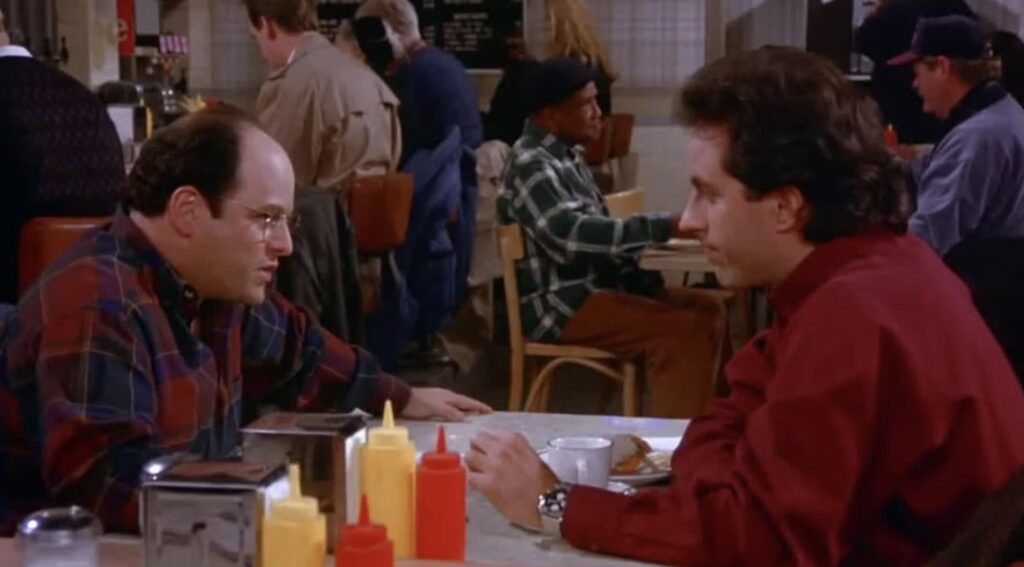
Because the writers have been carefully setting that scene up through all the other scenes written before it. The scene with Jerry and George pulling off the roommate switch was prefaced by ten scenes setting up the fact that Jerry was going out with a really lame girl who never laughed at his jokes and who he didn’t have any fun with. One day he dropped her off at her apartment and met her roommate and her roommate was the opposite. She was fun and laughed at everything he said. She was his ideal woman. But it didn’t matter because she was his girlfriend’s roommate and, therefore, there was no way for them to be together.
It’s only when you’ve seen Jerry and the girlfriend together a few times and experience their lame dynamic then see how electric it is between Jerry and the other girl that you fully understand this scene where Jerry sits George down to try and figure out if the impossible – the “Roommate Switch” – can be done.
Now, if we go back to that first scene, with the car reservation – that scene was reflective of early Seinfeld episodes, where they would write individual self-contained scenarios that had little-to-no setup. It’s like the writers said, “What’s funny? Oh yeah, when you go to the car reservation place and they don’t keep your reservation.” Then they would write that scene regardless of whatever the plot was.
There was no connective tissue. They just found funny situations and would ram them into wherever there was a hole in the script.
That’s not to say that scene can’t be good or that the car reservation scene wasn’t funny. I was exaggerating when I said it was weak. But a truly good scene rarely works unless you’ve watched everything before it. Because an essential component of good writing is using each scene to build that which you will pay off later.
This is not just true for comedy. It’s true for everything. If you showed your favorite scenes to people who have never seen the movies before, there’s a good chance they won’t think the scene is nearly as amazing as you do. That’s because they don’t have the context you do.
The operative lesson here is, every scene you write should only fully work for those who have watched everything up to that point. If the scene works all by itself, it doesn’t mean the scene is bad. But it definitely could’ve been a lot better.
You know what doesn’t have to be a lot better?
Inside Out.
This is one of those box office anomalies they’ll talk about for centuries to come. Nobody could crack the 100 million dollar mark for six months at the box office, and in just two weeks, one movie has pulled in 350 million. And three-quarters of a billion worldwide!
Usually, any box office assessment is silly Monday Morning quarterbacking. Everybody’s guessing at why *this* did well or *that* did badly. It’s fun but not relevant.
However, when a movie outperforms the market this much, a market that’s flailing, you have to take notice. You have to ask why. I know this itches people the wrong way but the lack of any message-pushing is partly why it’s doing well. The fact that it’s animated means it has the biggest potential audience to pull from. It isn’t like an R-rated flick where you only have access to 60% of moviegoers.
Also, shout out to screenwriting. The first Inside Out had an amazing screenplay. The world-building alone should be taught in film school. I still think it should’ve won the Oscar. That definitely played a part in people eagerly coming back for more.
But outside of that, I don’t know why it’s doing so well. It’s not like it had Nemo or Elsa or Simba or Woody. I doubt anyone even remembers what the main character’s name is. So it’s a bit of a mystery. There’s some people who are going with the old air conditioner theory. It was scorching hot all weekend and everyone wanted air conditioning for two hours.
I don’t know. I *will* watch it when it hits streaming. But it won’t be a theater movie for me.
By the way, this weekend is going to be nuts for content. The 27th is when The Bear Season 3 comes out. Netflix releases Beverly Hills Cop 4 the next day. And A Quiet Place comes out with its second sequel.
And here’s something to keep your eye on. That movie IS NOT being shown to critics. That is a GIANT red flag. I was worried about this movie THE SECOND I read that Death of Robin Hood script. That script was AWFUL. And when I realized that he was the one doing Day One, all my excitement was murdered. Cause those trailers were sooooo good. But, hey, I’m still hoping for the best. And it’s always nice to go into a movie with zero critical analysis clouding your judgment.
Okay, on to House of the Dragon.

To give you some context here, I used to get a lot of e-mails asking me why I never reviewed Game of Thrones episodes. Which was because I stopped watching the show in Season 5. I remember watching 4 episodes in a row where nothing happened. So I was frustrated. It wasn’t that I actively stopped watching it. I just never got back to it.
So I wanted to be on top of things this time around. I wanted to be there at the ground level. However, I’m starting to read some House of the Dragon backlash online. The ratings, supposedly, aren’t that high. I don’t know if I believe that, though. People literally watch stuff 20 different ways these days. There’s no chance they’re able to track views across all platforms/media.
What I’m looking for in episode 2 is some actual CRAFT to the storytelling. It can’t just be exposition exposition exposition exposition SHOCK at the end, like last week. Let’s find out what happened!
From a writing perspective, this episode is interesting. Because it’s dealing with a sort-of problem. When you kill off an important character, it is necessary that you commit to the ramifications of that story choice.
In other words, you can’t just jump forward and not mention anybody’s reaction to the child’s death, so that you can get to more exciting story threads.
The problem is, even though the character was technically important, it’s not a character we knew. It’s a baby. So it’s not like WE THE AUDIENCE need to grieve. Therefore, we would’ve been fine with moving on.
But since it doesn’t make sense for the characters to move on, the writers must commit to that choice. They must show us the funeral. They must sit in the sadness and the anger inherent in the multitude of characters close to the child.
To do this as a writer, you have to make a bargain with the audience. If you’re going to make them suffer through this, you have to give them some meat. And the best place to find writing meat is in the future. So, one of the first things we hear from the Hand of the King is: “Don’t worry, we’re going to go to war soon. But first we have to make some strategic moves to get a few more people on our side.”
This is the whole kit and caboodle with screenwriting. You have to promise the reader that, if they keep reading, they’ll be rewarded. “Cool shit is coming” is the gangster way of saying it. So we’ll suffer through eating soup for a few nights as long as we know we’re getting a five course meal (the war) at the end of the week.
But that doesn’t mean you can only focus on the sadness. We do get our share of sad scenes in the aftermath of this brutal assassination. But we need cool scenes. Scenes that grab us. And, in TV writing, the bread-and-butter way you do that is you put two people in a scene and ramp up the conflict.
So, the two big scenes in this episode are 1) When Rhaenyra confronts Daemon about initiating this assassination, which is going to weaken their support in the war. And 2) When the young King Aegon confronts the Hand of the King, Otto Hightower, about his crappy advice and forces him to give up his position.
The second scene stood out, in particular, because there was actually a consequence at the end of the scene. TV suffers from a lot of scenes where conflict happens but we’re at the same place at the end of the scene as we were at the beginning. So even though we got some drama, the scene ultimately feels unimportant. This scene actually ended in something happening so it became one of the best scenes in the episode.
The best scene of the episode, though, is at the end when the bad twin infiltrates the Queen’s quarters and tries to kill her. Remember that no amount of dialogue conflict will ever beat a character actually TAKING ACTION. When you have characters taking action, they are going to create SOMETHING. So it’s always a good idea to keep your characters active as opposed to waiting for the next conversation.
I do think that House of the Dragon is well-written. I don’t like some of these scenes, such as rando King Number 7 laying in bed with his wife mumbling about who knows what. But that’s one of the challenges of writing a show like this. You need to keep those characters in the mix so we don’t forget about them and, sometimes, you don’t have anything for them to do, so you just give us a weak reminder scene. But it’s definitely one of the better-written shows out right now. What’s better?
